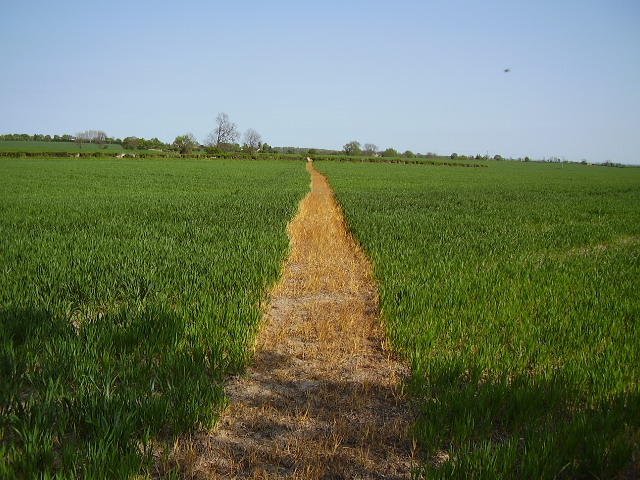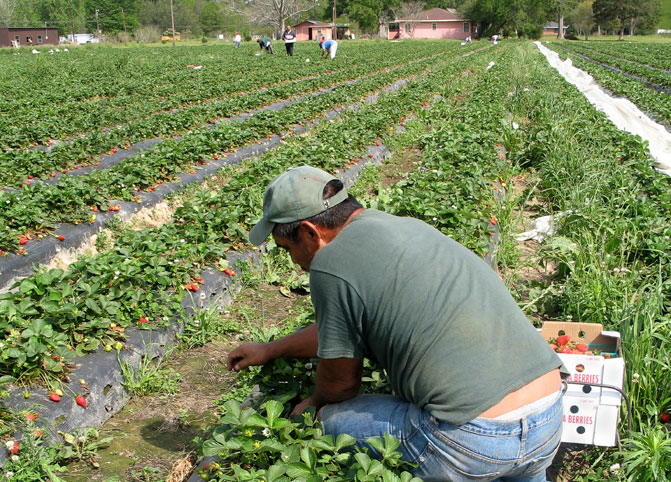Tomás García Azcárate, who maintains a very useful blog on the CAP with links to his university course notes and a series of CAP capsules, recently paid me the compliment of discussing a comment I made in an article on CAP greening on the function of cross-compliance. My comment was that “… the strong political support for the view that direct payments are, in part, recognition of the costs that the society asks farmers to bear through cross compliance implicitly undermines the “polluter pays principle. If farmers who do not receive direct payments are not expected to observe cross compliance standards, then these do not form the environmental baseline”.… Read the rest
Cross compliance for labour laws?
The Global Mail reports on a shocking case of alleged abuses of migrant workers in the Spanish horticulture industry, concentrated in the southern Spanish region of Almería along a 200km strip of hothouses known as el mar de plásticos. This is where much of Europe’s salad vegetable crop is grown.
Allegations range from payment below the minimum wage, employment of illegal migrants, intimidation and, in the most recent case, murder. The UK’s Guardian newspaper’s special correspondent Felicity Lawrence wrote a startling report into labour abuses in €2 billion a year hothouse industry. She found:
… Read the restMigrant workers from Africa living in shacks made of old boxes and plastic sheeting, without sanitation or access to drinking water.
German call for reform of CAP payments
The German Council for Sustainable Development has just published a report highlighting the environmental damage caused by intensive agriculture and calling for a reform of the CAP direct payments system. It proposes a three-fold structure of payments: an environmental basic payment, a series of targeted agri-environmental payments for farmers who accept higher obligations, and a series of payments for high nature-value areas where the continuation of agricultural production is desirable but threatened on economic grounds.
For the environmental basic payment, it suggests that eligibility would be conditional on farmers turning over at least 10% of their area to environmentally-friendly husbandry with a view to maintaining a high level of biodiversity in the agricultural landscape throughout the EU.… Read the rest
Does France really want to suspend agri-environmental measures?
The president of the main farmers’ union, the Fedération Nationale des Syndicats d’Exploitants Agricoles (FNSEA) Jean Michel Le Metayer called for “a pause in agri-environmental measures” and the suspension of new measures. For French speaking readers, the (short) video is here.
The Ministry of agriculture seems sympathetic with this position, even though Nicolas Sarkozy has recently positioned himself as greener than his predecessors, with initiatives under a framework law called the “Grenelle of the environment” and a carbon tax (it turns out that farmers should be exempted from paying this tax, eventually). The French minister Bruno Le Maire apparently said a few days after that, indeed, a revision of the agri-environmental measures (AEM) was necessary and that it should start with an inventory of the provisions adopted throughout the Union according to the newspaper Le Figaro.… Read the rest
10 reasons why the Single Payment Scheme is politically unsustainable
The EU spends around 30 billion euros each year on the single payment scheme, by far the largest of the myriad schemes and programmes that together comprise the 54 billion euro budget of the Common Agriculture Policy. The scheme was first introduced in 2005 but it is hard to see it surviving in its current form beyond the end of the EU’s 2007-13 financial perspective. Here are five reasons why the single payment scheme is not politically sustainable. Five more will follow tomorrow.… Read the rest
Court of Auditors' report on cross compliance is damning
It’s no wonder that the Commission suppressed the Court of Auditors report on cross compliance for as long as it could – the report is damning and undermines the Commission’s case for the legitimacy of EU farm subsidies.
Speaking in 2005, Agriculture Commissioner Mariann Fischer Boel explained how she sees cross compliance in relation nearly 40 billion euros of public expenditure on payments to farmers:
… Read the rest“I would emphasise that decoupled payments are not “money for nothing”. To get the cheque in the post, a farmer has to respect a demanding range of standards related to the environment and animal welfare. We call this system “cross-compliance”.”
Court of Auditors’ report on cross compliance is damning
It’s no wonder that the Commission suppressed the Court of Auditors report on cross compliance for as long as it could – the report is damning and undermines the Commission’s case for the legitimacy of EU farm subsidies.
Speaking in 2005, Agriculture Commissioner Mariann Fischer Boel explained how she sees cross compliance in relation nearly 40 billion euros of public expenditure on payments to farmers:
… Read the rest“I would emphasise that decoupled payments are not “money for nothing”. To get the cheque in the post, a farmer has to respect a demanding range of standards related to the environment and animal welfare. We call this system “cross-compliance”.”
Commission did suppress cross compliance report, says MEP
A week ago I asked why a unfavourable report on cross compliance by the Court of Auditors, adopted on 4 November, has not yet been published. I wondered whether it had anything to do with the imminent end game of the health check negotiations, which featured propoals to further weaken cross compliance requirements. Turns out my hunch was correct. The Commission did not want the report to see the light of day, at least not until the health check was done and dusted, according to Paulo Casaca MEP. … Read the rest
Cross compliance: is the Court of Auditors being gagged?
As Wyn Grant has observed, the Court of Auditors annual report on the 2007 EU budget published on Monday identified a clutch of weaknesses associated with the controls on spending on EU farm policies. The Court observes that “Some 20 percent of payments audited at final beneficiary level and revealed incorrect payments, a limited number of which had a high financial impact.” It concludes that farm subsidies remained “affected by a material level of error of legality and/or regularity”.
Strangely absent from the Court’s report was an evaluation of cross compliance – the environmental and animal health and welfare conditions that are required of all recipients of CAP direct payments: public expenditure which totals some 36 billion euros a year (28 billion euros of which is spent under the Single Payment Scheme).… Read the rest
European Parliament takes aim at CAP direct payments
A new report commissioned by the Budget Committee of the European Parliament makes interesting reading. The report, written by Jorge Núñez Ferrer (a former Commission fonctionnaire) and Eleni A. Kaditi, both of the Centre for European Policy Studies in Brussels, aims to asses whether the CAP provides ‘added value’. Núñez Ferrer and Kaditi define this as whether “the benefits outweigh the costs, not only of implementing the policy, but also the costs created in other areas.” The authors don’t pull their punches, particularly when it comes to direct payments which, costing some €30 billion a year, are by far the biggest ticket item in the CAP.… Read the rest


